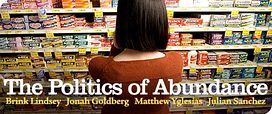As I’ve been concentrating mostly on where I disagree with Brink, let me say that I do agree with the basic thesis that wealth creates a libertarianish ethos. The richer you get, the less you think you need the government because – duh – you need the government less. People who can afford to use FedEx and online banking instead of the mail, have employees to cut through government red tape, drink bottled water, send their kids to private schools, and live in crime-free neighborhoods will see government as minimally intrusive or minimally necessary in their lives. I don’t think the political repercussions are as clear cut as Brink does, but I do agree that politics will be increasingly constrained or at least influenced by this essentially libertarianish lifestyle.
But let me suggest a way in which the libertarianism of the affluent may not have the consequences Brink (or I) would like. Take Hollywood millionaires, whom I will caricature in order to make my point more clearly. In many respects they are the most libertarian people in America. They rely on government for nothing and have precisely the libertine cultural mores Brink calls libertarian. They believe sexual liberty and free expression are the highest values in civilization. They are pro-choice, and so “open-minded” on social issues their brains often fall out. And yet, your standard hyper-rich Hollywood liberal supports government intervention more than any other demographic I can think of. Wealth has always had a tendency to create a noblesse oblige among aristocrats, even when the aristocrats see themselves as libertarians of a sort.
This creates a challenge for conservatives — but also for libertarians. A classic conservative argument (with Tory and neocon variants) is that poor people cannot afford the values of libertine rich people. Madonna admits she has never changed a diaper and has a gaggle of handmaidens tending to her and her children’s needs. She can afford her slattern chic. A female cashier at a supermarket cannot afford Madonna’s values. The conservatives were basically right about Murphy Brown. But because libertine elites are also egalitarians they believe that if it’s wrong to judge their lifestyles, it must also be wrong to judge anyone else’s. The elite culture’s obsession with the evils of hypocrisy demands that what’s good for the millionaire be good for the waitress too. But, as a simple fact of logic and common sense, poor people cannot afford to make the mistakes rich people make.
This has very real consequences for the culture and, more relevantly, the role of government. Because the poor cannot afford a sinful lifestyle (sorry for using the “s” word here at Cato) the need for government to help becomes greater. Now a good libertarian might argue that the poor should simply learn from their mistakes and, even if they don’t, that doesn’t justify state intervention. And I largely agree with that argument. But lots of people don’t. And that’s where the noblesse oblige kicks in. Libertarianish elite liberals want the state to buy for the poor what the rich can buy for themselves.
Meanwhile, old fashioned middle-class values — upon which wealth and abundance depend — are routinely mocked from all sides. Indeed, when it comes to the cultural arena, libertarians spend much of their energy tittering at conservatives for caring about such fusty concepts as values and morals. I would argue that’s counter-productive to the Brink Lindsey Project.

